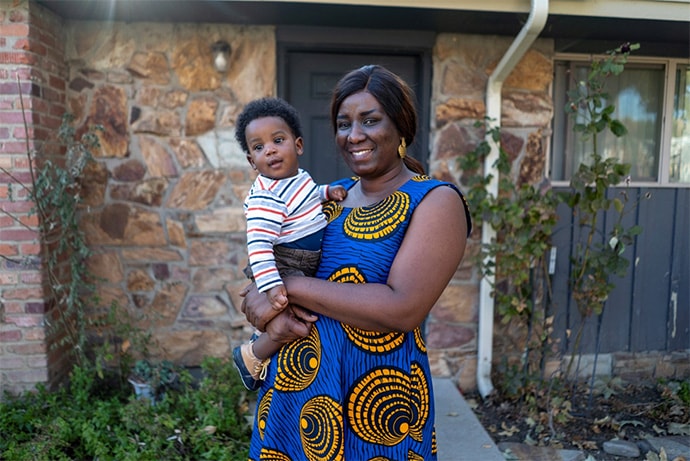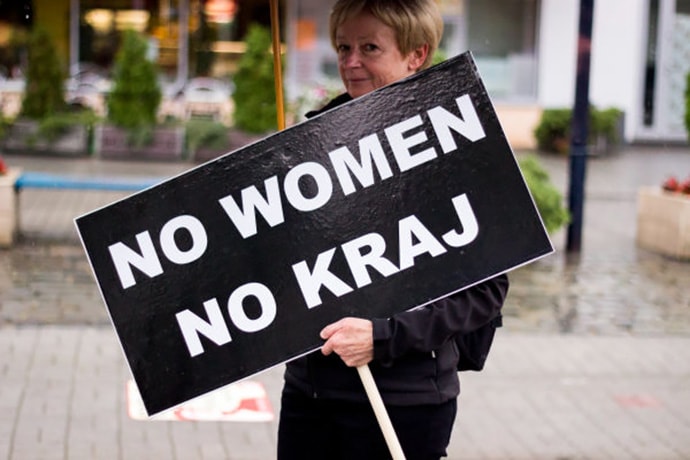Posted on August 2, 2023
By Lidet Gezahegne, Community Sponsorship Coordinator, IRC

Photo: Andrew Oberstadt for the IRC. Jacqueline stands outside her home with her son, Zoe who is one. Jacqueline Uwumeremyi, 43, fled the Democratic Republic of Congo to South Africa in 1998 because of escalating violence. She and her children were resettled in Boise by the IRC in October 2018. There she was welcomed by the local church community who helped Jacqueline navigate American customs and culture. Today, Jacqueline works as an interpreter, speaking five languages, and she is now the one helping other refugees adapt to their new community.
The International Rescue Committee (IRC) Co-Sponsorship Program is a remarkable initiative that allows ordinary people to make a profound impact on the lives of newly arrived refugees.
This program sets a precedent for how communities can come together to create a nurturing environment, offer hope, stability, and solidarity, ensuring a smoother transition, and brighter future for those fleeing from difficult circumstances.
Continue Reading
Posted on August 2, 2023
By Women’s Link Worldwide

Czarny Protest| Credit: Iga Lubczańska © Licensed under CC BY 2.0
At Women’s Link Worldwide, we seek to highlight the ways in which women, girls, and gender diverse people – existing at the intersection of varied marginalizations – uniquely live the refugee and migrant experience. We’ve borne witness to how their gender plays a role in their risk of trafficking, sexual violence, inadequate responses to their reproductive health needs, and other human rights violations.
Continue Reading
Posted on July 31, 2023
(Seattle, WA – July 31, 2023) Global Washington (GlobalWA), a 501(c)(3) non-profit organization whose mission is to support the global development community in Washington State, announced today that Pangea Giving, a Seattle-based giving circle operating since 2003, will become a program of GlobalWA starting August 1, 2023. The merger of the two organizations will create an unparalleled platform for global philanthropy and strategies to improve lives in low- and middle-income countries.
As a program of GlobalWA, Pangea will be able to increase its member engagement, capacity, educational activities, partner relations, and programs in Seattle. For GlobalWA, having Pangea as part of its growing number of programs increases the ability for GlobalWA member organizations to co-create and partner with organizations based outside the U.S. for increased impact, and will create additional avenues of involvement for philanthropists. All with the ultimate vision to create a more equitable, healthy, and prosperous world.
“This is an exciting moment for both organizations,” said Kristen Dailey, Executive Director of Global Washington. “We will have enhanced services, educational events, and opportunities for co-creation that will include more diverse perspectives and support localization for better outcomes. Merging with Pangea also builds on our work with our Women of the World program that supports female philanthropists who care about global issues.”
GlobalWA board member Jane Meseck is also looking forward to new opportunities, “GlobalWA members will now have more ways to collaborate with Pangea grantees and learn from in-country examples for global philanthropy. It also aligns beautifully with our new strategic plan, expanding our learning network to an impact network.”
“It’s a win-win agreement,” said Janet Pearson, Board President of Pangea. “When we formed Pangea in 2003 with the vision to promote more direct and positive international engagement, we could not have imagined a better outcome now 20 years later. By joining forces with GlobalWA we will be able to fulfill our mission even better and reach more individuals who want to join Pangea. And, this is really exciting and necessary, especially with the many challenges grassroots organizations and communities in the Global South face today.” Pearson then adds, “It satisfies our need for expanding grant development, partner relations, and Pangea member support.”
Pangea’s branding and name will be maintained as a program of GlobalWA. A Pangea Advisory Council will be formed within GlobalWA to continue the vetting, recommendation, and evaluation of grants. The GlobalWA board will have ultimate fiduciary responsibility and final approval of grants, and one Pangea member would become a GlobalWA board member.
For any questions about this announcement, please email Joel Meyers, Director of Communications at comms@globalwa.org.
Learn more about the Pangea Giving program.
ABOUT GLOBAL WASHINGTON
Global Washington supports non-profit organizations, businesses, foundations, and academic institutions in Washington state working to improve lives in low and middle income countries. We connect, promote, and strengthen our members, increasing their impact and advancing a vibrant, innovative, multi-stakeholder network. Our work is driven by the desire to create a more equitable, healthy, and prosperous world.
ABOUT PANGEA GIVING
Pangea Giving is a giving circle that gives their members and supporters direct, thoughtful, and effective ways to help grassroots organizations in the Global South to improve the quality of life in their communities. Their work includes leveraging resources, increasing visibility, sharing best practices, and advocating around education, global engagement, and foreign policy.

